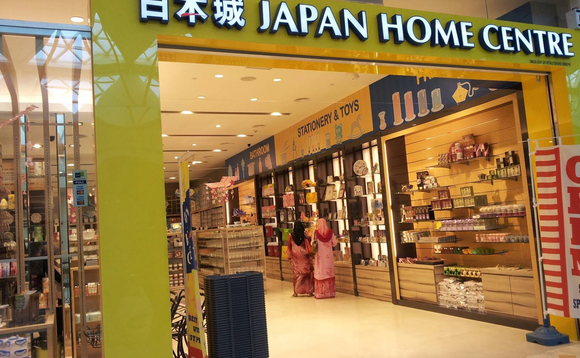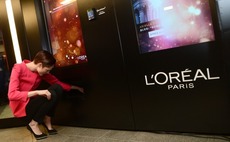
Portfolio: EQT Partners and Japan Home Centre

In 2010 Japan Home Centre was already a successful domestic brand but to realize its IPO ambitions it needed the right partner to guide it through a period of rapid expansion – EQT Partners
Despite its name, Japan Home Centre has little connection to the country. It is actually the flagship brand of a home-grown Hong Kong enterprise - International Housewares Retail Company (IHR) - founded by Peter Lau and Lisa Ngai in 1991.
However, the name goes some way to explain its roots. The company was first established as a one-price store, modeling after Japan's popular 100-yen shop concept - or dollar store in the US - with most of its products sourced from Japan. However, by 2010 the business had long since abandoned this model, broadened its range of products and evolved into Hong Kong's leading discount houseware chain.
By the end of fiscal year 2011, IHR had grown to more than 213 directly-owned stores in Hong Kong - including its up market City Life and EPO Gift and Stationary store brands. In addition, it had several overseas licensed stores in East Malaysia, UAE, New Zealand and Saudi Arabia, with group sales of around HK$1 billion ($128 million).
For Lau and Ngai the next step was to go public, but the business was in need of a suitable pre-IPO investor to provide capital and guide the firm through further expansion and the eventual listing. The founders hired PricewaterhouseCoopers to run a limited auction and a handful of investors registered their interest, among them EQT Partners.
"At that point the company had 19 years of history, it was a major housewares retails chain in Hong Kong and it had strong cash flow," explains TakWai Chung, a partner with EQT. "It had also remained a very stable business throughout several different economic crises. We thought we could really add value to its overseas expansion strategy."
After around four months of negotiations, EQT emerged as the preferred candidate. The deal closed in early 2010, with the private equity firm paying HK$224 million for a 40% stake, investing through EQT Greater China II.
The aim was to take IHR public within four years of the investment. In the interim EQT would help drive organic and inorganic expansion overseas while simultaneously consolidating the company's market position at home.
"We liked the technical experience that came with EQT," says Lau. "My partner and I built the business from a single shop so we didn't have experience of bringing a company to IPO. We also believed that if we were going to expand overseas with reasonable speed we would need help in making acquisitions."
EQT's started by bringing in some key people. Ina Cheng, former head of retail and marketing at Marks & Spencer in Hong Kong, was hired as COO, with Yiu Keung Yeung - an EQT advisor ex-CEO of KFC Hong Kong and Macau and former COO of hotpot chain Little Sheep - joined the board and provided operational consultancy.
Acquisition trail
One of the first tasks was a strategic review of the overseas business. Until then all of IHR's overseas stores had been licensed stores. It was decided to accelerate expansion in new markets but to concentrate on direct ownership of stores rather than licensed stores, thereby enabling the company to control both the pace at which new stores where set up and how they were run. This was done though acquisition and by establishing of a number of local joint ventures.
Singapore was the initial target, given its similarity to Hong Kong in terms of size, demographics and culture. There was a separate chain of 17 stores operating in the territory as Japan Home - as the name was similar to IHR's own flagship brand, the firm decided to keep it.
The deal was finalized in November 2011 after a year-and-a-half of negotiations with IHR buying 60% of Japan Home for S$4.3 million ($3.4 million) in cash and shares in a new joint venture. The entrepreneur, Chin Chain Yong, contributed S$2.3 million to the venture and stayed on to oversee daily operations.
It had taken Japan Home 12 years to set up 17 stores, but under new ownership the Singapore network quickly grew to 38 outlets.
"The pace of expansion is so much faster when you are in control and you can drive the expansion strategy," says EQT's Chung. IHR was able to make some key changes to the merchandising, using its own sourcing capabilities and replacing many of the lower quality China-sourced items to upgrade the chain's entire product portfolio.
IHR then turned it sights to Malaysia, forming a 58.25% joint venture with a local partner already well-known to the business - a previous franchisee from about 10 years ago, Lim Shek Han. He had to be persuaded to put his money into the new venture and this was achieved by explaining the upside of the business and offering an equity incentive on IHR going public. Han made capital investment of MYR60,000 ($18656).
Chin, the Singapore joint venture partner, also took a stake in the Malaysian venture earlier this year, contributing a further MYR1.8 million.
Lau stresses the importance of leveraging the knowledge of a local partner in a region where cultural differences are more pronounced. The strategy was to introduce the same range of core products sold in Hong Kong and then adjust the range to suit local needs and tastes. As such the rate of expansion has not been as rapid as in Singapore. IHR now has nine directly own stores in Malaysia.
"There are different shopping malls and culture centers and they all have different needs, so we are constantly adjusting," says Lau. "But basically we believe value for money is what the customer wants regardless of culture, so our approach is to adjust the smaller items gradually to fit the Malaysian market."
IHR then looked to expand into China, first by acquiring six outlets from Nanjing Yuguan Trading Company, Suzhou Shuohui Trading Company and other individuals for a RMB366,658 (USD60,000) before setting up 85.6%-owned joint venture with local partners. The company trades under the Living Plus brand - so named because in China it is illegal to register businesses with a country name in the title.
This was followed by the outright acquisition of five stores in Macau for HK$8 million.
Store strategy
In terms of rejuvenating the company's core domestic market, the focus was not only on the number of new stores but also same store sales (SSS) growth. While official numbers are not published, EQT's Chung explains that at the time of investment SSS growth was only 4.9% in fiscal year 2011, but that has since grown to 12.1%.
This has come through a combination of driving more traffic through the store and encouraging the purchase of more items per transaction. Marketing spend was only part of this effort. IHR has also gone through an extensive store re-profiling program. The aim was to improve the classification process and look at income levels in different regions to ensure the right customer were being targeted with the right merchandise in the right stores.
Prior to EQT's involvement, IHR only had three categories of store, classified by size. Now there are nine.
"The exercise was essentially to enhance and optimize the merchandise portfolio based on purchasing power and preferences,," says Chung. "For example, the aromatic fragrance product category had previously not existed, but we realized that by targeting customers with higher spending power it could sell very well in certain stores."
There has also been a focus on expanding it the firm's customer base and looking beyond its core demographic. While the typical customer has always been the middle income housewife, the firm is now actively targeting the younger and male demographics.
This is in part reflected by a broadening of the product mix in selected stores. For example, household electronics has grown from being a very small category many years ago to accounting for 20.7% of revenue.
The second part of the domestic rejuvenation process involved a review of product sourcing. Mainland China is the obvious choice and 70% of IHR's goods come from there, but the appreciation of the renminbi against the Hong Kong dollar has made it more difficult for the company to improve its gross margins.
"How we could continue to improve margins was by replacing the middle man," says Chung. "We leveraged our increasing procurement volume to take out distributors from our supply chain and increase the number of directly-sourced products in the mix."
Lau adds that the company's main source of profit over the last 10 years has been this ability cut out the middle man. Today the company sources products from nearly 650 factories in 13 countries. It is also using more suppliers outside China, with South Korea, Japan, Thailand, Malaysia, and Indonesia featuring prominently. The ambition is that in a few years China will account for just under half of IHR's products.
Another means of expanding gross margins is IHR's private label strategy - replacing general consumer brands with a range of IHR exclusive brands sourced directly from manufacturers. Japan Home Centre brands now include: Kagaku stationary, Naxos personal health products, Matsusho electrical appliances and EZ Keep storage items. Around 51% of IHR products are now either sourced directly or unique to the company and 47% is Hong Kong sourced.
Aggressive expansion abroad and a change of strategy at home appear to be paying off. Operating profit reached HK$129million for the year ended April 2013, up from HK$76 million two years earlier, demonstrating a compound annual growth rate of 30.1%.
The company will continue its expansion with HK$242 million earmarked to finance new store roll-outs. A further 20% of proceeds will be put towards improving logistics warehousing, while the remainder will be used to renovate existing stores in Hong Kong and Singapore, improving IT systems and providing working capital.
Singapore and Malaysia are regarded as the most attractive overseas markets. By the 2016 financial year IHR hopes to have 108 stores in the former and 59 in the latter. "We believe in the long run Maladysia should be a good market as they have good buying power, they have a lot of shopping centers and rent and labor is lower than in Singapore," says Lau.
Progress is expected to be slower in China where regulatory hurdles and immaturity of the market has set a more conservative pace for expansion. Currently the market is divided into two main channels - local mom and pop stores and hyper markets - with an even smaller segment consisting of the up-market houseware bought in department store.
EQT's Chung explains that a dominant player within the specialized houseware chain concept has yet to emerge but IHR will have to adapt its approach.
"What we have chosen to do in China is an upgraded version of what we have in Hong Kong, because it is less economical to compete on price alone in China," he explains. "So we have taken a bit more effort to refine the merchandising with a combination of imported items and items we can put a theme or a concept around."
IHR plans to open three more store in China and 20 more in Macau over the next three years.
The company realized its long-held ambition to go public in September, raising around HK$693 million, including over-allotment, through a Hong Kong IPO. Net proceeds accruing to IHR were approximately HK$462 million. EQT's holding fell to 21% due to a combination of the dilution effect and a partial exit amounting to 5% of the company on a fully diluted basis.
The private equity firm has liquidity - IHR's stock has gained 14% since it started trading compared to a 0.50% increase in the Hang Seng Index - but there are no plans to cash out just yet.
Latest News
Asian GPs slow implementation of ESG policies - survey
Asia-based private equity firms are assigning more dedicated resources to environment, social, and governance (ESG) programmes, but policy changes have slowed in the past 12 months, in part due to concerns raised internally and by LPs, according to a...
Singapore fintech start-up LXA gets $10m seed round
New Enterprise Associates (NEA) has led a USD 10m seed round for Singapore’s LXA, a financial technology start-up launched by a former Asia senior executive at The Blackstone Group.
India's InCred announces $60m round, claims unicorn status
Indian non-bank lender InCred Financial Services said it has received INR 5bn (USD 60m) at a valuation of at least USD 1bn from unnamed investors including “a global private equity fund.”
Insight leads $50m round for Australia's Roller
Insight Partners has led a USD 50m round for Australia’s Roller, a venue management software provider specializing in family fun parks.







